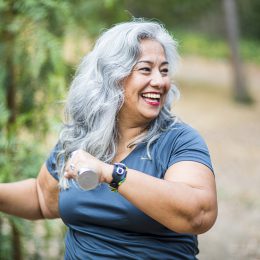Your Most Urgent Questions About COVID-19 Booster Shots, Answered
Who should get a third shot? Can you mix and match vaccines? Here’s what you need to know.

It may seem like just yesterday that you got your second shot of one of the two COVID-19 mRNA vaccines, Pfizer or Moderna. While just a few months ago you may have been counting down the days until you were fully vaccinated—two weeks after your second dose—the Centers for Disease Control and Prevention (CDC) is now recommending that some people get a third dose to remain fully protected.
Who needs it, and who can wait a bit? And should you expect the same side effects? Here are the details, as well as some advice from two leading infectious disease specialists.
What is a booster shot exactly?
A booster dose is another dose of a vaccine that is given to someone who had enough protection after their initial vaccination but has had that protection wane over time. Another example of a vaccine where you might receive boosters is the Tdap vaccine. (A booster is different from an additional dose of a vaccine, which is sometimes required for people who are moderately to severely immunocompromised and don’t build enough immunity from the original inoculation.)
The director of the CDC, Rochelle Walensky, M.D., M.P.H., has recommended COVID-19 booster shots this fall for many Americans, after weighing guidance from the U.S. Food and Drug Administration and a panel of experts at the CDC.
Who is eligible to get a booster now?
The CDC says the following individuals are eligible for a single booster dose of the Pfizer, Moderna, and Johnson & Johnson COVID-19 vaccines:
- People 65 or older should receive a booster
- People who live in a long-term care facility should receive a booster
- People ages 50 to 64 who have an underlying medical condition (such as diabetes, cancer, heart disease, asthma or another lung disease, etc.) should receive a booster
- People ages 18 to 49 who have an underlying medical condition may get the booster, based on their individual risk and benefit profile
- People who live or work in a setting that puts them at high risk may get a booster, based on their own risk and benefit profile. (This group includes firefighters, police officers, health care workers, teachers, college students, frontline workers such as grocery clerks, and others.)
Those who received either the Pfizer or Moderna two-shot vaccine series should wait at least six months before receiving a booster. And those who received a single-dose Johnson & Johnson vaccine should wait at least two months, according to the CDC.
What if I’m immunocompromised?
You should get a third dose at least 28 days after your second mRNA shot. This third dose is not considered a booster. Rather, it is now part of the recommended immunization schedule for those with compromised immune systems.
“If you’re severely immunocompromised, there’s a real consensus that you need a third shot, as it’s unclear how well immunocompromised people responded to the first two shots,” says John Swartzberg, M.D., clinical professor emeritus of infectious diseases and vaccinology at the University of California, Berkeley.
Right now, the CDC recommends that people with moderately to severely compromised immune systems—who make up about 3 percent of the adult population—receive a third dose of an mRNA COVID-19 vaccine at least 28 days after the second dose of their initial shot.
You may be eligible if:
- You’re currently undergoing cancer treatment.
- You’ve had an organ transplant and take medication to suppress your immune system.
- You’ve had a stem cell transplant within the last two years.
- You have advanced or untreated HIV.
- You’re on medication that suppress your immune response, such as high-dose corticosteroids.
Research suggests that some people who are immunocompromised don’t build up the same level of protection as other fully vaccinated folks, explains Dr. Swartzberg. In fact, early research from the CDC suggests that fully vaccinated immunocompromised people make up a large share of hospitalized “breakthrough” cases.
Should your additional shot be the same brand you got before or a different one?
The CDC has authorized what’s being called a mix-and-match booster strategy. This means that those who are eligible for boosters may choose a booster dose of a vaccine that is different from the one they initially received. So, if you received the Moderna series, for example, you can get a Pfizer booster. The CDC made this decision based on early evidence that suggests mixing two Covid-19 vaccine types triggers a stronger immune response than matching the booster to the vaccine type you initially received.
Subscribe to our newsletter
It's quick and easy. You could be one of the 13 million people who are eligible.
Already a member? Click to discover our 15,000+ participating locations.
Follow Us
If you’re immunocompromised, the CDC recommends sticking with the shot you already got—either the Pfizer-BioNTech or Moderna COVID-19 vaccine. But if it’s not available, ask your doctor about switching. “The answer is that it’s probably fine, but we do need data to know for sure,” says Dr. Swartzberg.
Should you expect similar side effects from a third shot?
Booster shots contain the exact same doses as the initial ones, so if you had a strong reaction to your second shot, it might happen again, says Dr. Gandhi. Symptoms can range from a red, swollen, painful arm to a headache, muscle pain, chills, nausea, and a low-grade fever. You can take over-the-counter pain relievers such as ibuprofen or acetaminophen to help with these side effects.
If you’re due for a mammogram, speak with your doctor: Since you may have some swelling in your underarm lymph nodes, it can cause a false reading, so some experts recommend waiting four to six weeks after getting any shot of this vaccine before getting a mammogram.
How can I get a booster or third dose if I qualify?
Covid-19 boosters are currently available. Health departments, pharmacies, and doctors’ offices are administering boosters and third doses in much the same way they rolled out the initial doses. It’s best to call ahead to find out how to schedule—and bring your vaccine card. You may also find scheduling information on your state’s health department website or pharmacy websites. If you’re immune compromised, talk to your health care team about the best way to get a third dose.
Check Your SilverSneakers Eligibility Instantly
SilverSneakers members can go to thousands of gyms and fitness locations across the nation, plus take SilverSneakers LIVE online classes that are designed for seniors of all levels. If you have a Medicare plan, it may include SilverSneakers—at no additional cost. Check your eligibility instantly here.
Not eligible for SilverSneakers? You can still get 200+ free SilverSneakers On-Demand videos and stay in touch with us by creating your online account.




